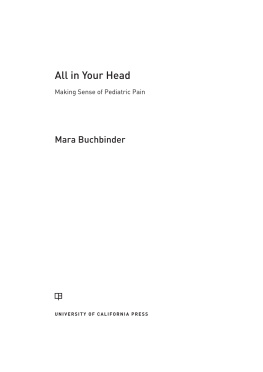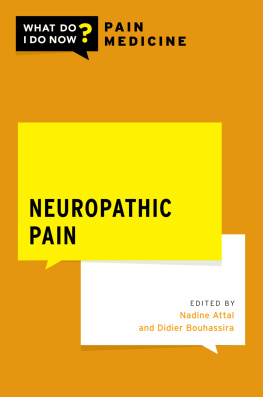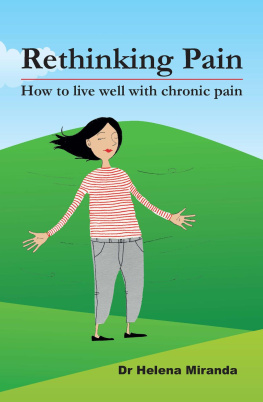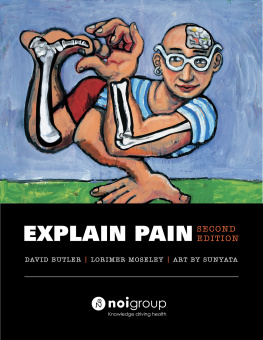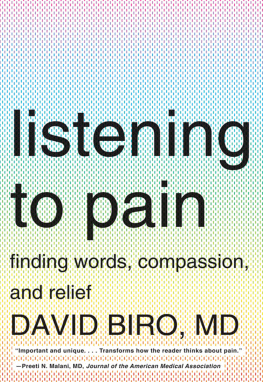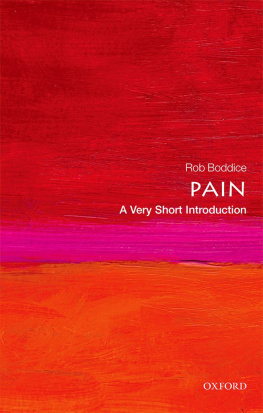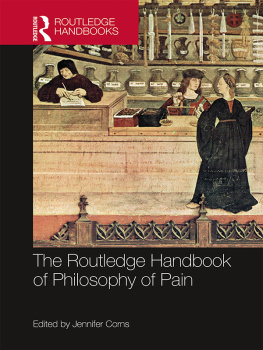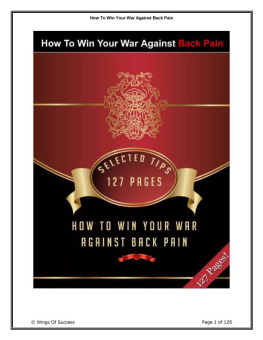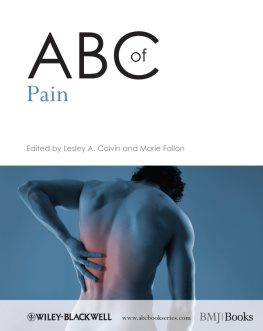Acknowledgments
This book considers what can be gained by thinking about chronic pain not only as a private experience, but also as one that is managed, explained, and understood in deeply relational ways. Much like chronic pain, I have found writing a book to be a much more social endeavor than is often assumed. Insights, introductions, kindnesses, and conversations offered by my colleagues, mentors, family, and friends have left a profound impression on me and on my research, and have helped to shape the story I have to tell in the pages that follow.
My greatest debt is to the clinicians, patients, and families who welcomed me into their worlds and shared their experience with me. Marcia Meldrum and Ignasi Clemente facilitated the introductions that made this research possible, and I am appreciative of them for supporting this work from the beginning. Although I cannot thank her by name, I am particularly grateful to the person I call Dr. Novak for seeing the value of anthropological research on clinical problems and supporting my research from the beginning. I am immensely grateful, too, for the adolescents and families who trusted me during some of their most vulnerable moments and gave so generously to this project.
This book began as a doctoral dissertation, and I could find no better intellectual role models for the specific areas of inquiry that I bring together in this book than the members of my PhD committee at UCLA. Linda Garro and Jason Throop are among the most prominent scholars in the anthropology of pain and have provided gracious, consistent guidance in this area, while Elinor Ochs and John Heritage taught me how to approach language as a fundamental dimension of social life. As dissertation co-chairs, Linda and Ellie offered complementary strengths and made me especially grateful for fortuitously finding an intellectual home during my doctoral training that recognized the productive synergy between medical/psychological and linguistic anthropology. I am especially grateful to Jason for introducing me to Reed Malcolm and helping me to find a home for this book. I also benefited during my graduate training from steady support from a number of other UCLA faculty members, particularly Carole Browner, Stefan Timmermans, Candy Goodwin, and Alessandro Duranti.
I am grateful to the University of North Carolina at Chapel Hill and the broader Triangle area for providing such a warm, generous, and lively intellectual environment for nurturing this book. I could scarcely have imagined landing in such a dynamic spot as a newly minted PhD in medical anthropology. At UNC, I thank my colleagues in the Department of Social Medicine, especially Sue Estroff, Barry Saunders, Raul Necochea, Rebecca Walker, Annie Lyerly, Jill Fisher, Jon Oberlander, Eric Juengst, Arlene Davis, and Department Chair Gail Henderson, and my colleagues in the Department of Anthropology and Moral Economies of Medicine working group, especially Michele Rivkin-Fish, Jocelyn Chua, and Peter Redfield. I also owe a huge debt of gratitude to my local writing partnersJocelyn Chua, Nadia El-Shaarawi, Lauren Fordyce, Tomas Matza, Saiba Varma, and Harris Solomoninspiring colleagues and friends who offered valuable criticism as this project was coming to a close. Their camaraderie, support, and generous feedback left me feeling confident and energized about the project during moments of doubt. I am grateful to Nadia for many loops around Dukes East campus and so much more.
My thinking and writing have also benefited tremendously from conversations with and written comments from Steve Black, Paul Brodwin, Beth Bromley, Bambi Chapin, Megan Crawley-Matoka, Hanna Garth, Jennifer Guzman, Mark Luborsky, Cari Merritt, Keith Murphy, Sarah Pinto, Sonya Pritzker, Michele Rivkin-Fish, Rayna Rapp, Sarah Rubin, Andrea Sankar, Merav Shohet, Stefan Timmermans, Kristin Yarris, and Allan Young. Three anonymous reviewers read a complete draft of the book manuscript and offered insightful feedback that pushed me to clarify my arguments and my central intellectual contributions. I am most grateful for their time, efforts, and generous care, which truly represent the pinnacle of unpaid academic labor. I am also grateful to the participants of the 2012 Rise of Child Science and Psy-Expertise workshop at Brunel University and the Royal Anthropological Institute, especially to the organizer, Dominique Behague.
The research on which this book is based was funded by generous support from the National Science Foundation and the Wenner-Gren Foundation for Anthropological Research. Time for writing and thinking was made possible by a scholarly residency at the Brocher Foundation in Hermance, Switzerland, in May 2012, a UNC CTSA Interdisciplinary Clinical Research Career Development Award from the National Institutes of Health (KL2TR001109), and a semester of teaching leave from the Department of Social Medicine at UNCChapel Hill. I am also grateful to have received a publication grant from UNCs University Research Council.
I thank Reed Malcolm at the University of California Press for seeing value in this project and for making the editorial process smooth and transparent from start to finish. I am especially grateful to Reed for soliciting such valuable reader reports from my anonymous peer reviewers. Stacey Eisenstark and Rachel Berchten demonstrated the utmost attention and care in guiding the book (and its author) through the production process.
My parents, Harriet and Marty Yogel and Stephen Buchbinder, my sister Emily Hutton, and my in-laws, Catherine and Craig Summers, have been steadfast supporters of my work and gave me space and time to write on many visits home. Among the many members of my extended clan of step-siblings, whom I am very lucky to call family, the chronic pain experiences of my inspiring sister, Diana Falchuk, were never far from my mind when I began working on what became chapter 2 of this book. Diana also played an important role in helping me to launch my research career by introducing me to Michael Rich and Jennifer Patashnick at the Childrens Hospital, Boston, where I started the work that became my undergraduate honors thesis. Jesse Summers discerning eye has scanned every page of this text except for these acknowledgments. I have been lucky to have a partner who continually challenges me to strive for greater clarity, brevity, and humility in my thinking and writing. His greatest gift, however, has been to share his life, and his love, with me.

